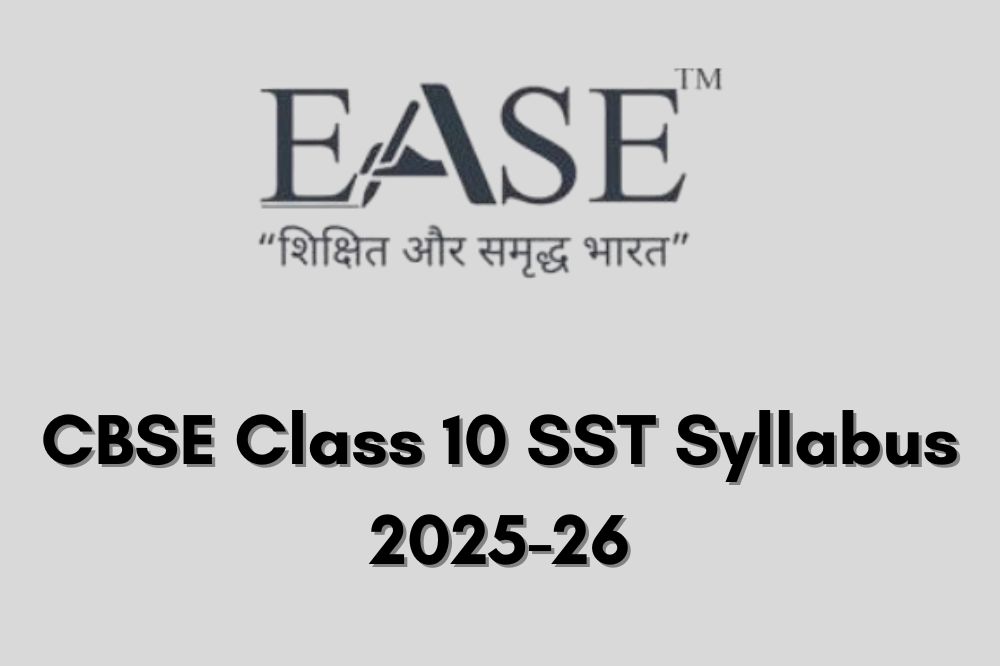The CBSE Class 10 SST Syllabus 2025-26 is more than just a list of chapters—it’s a roadmap for students preparing for one of the most important academic milestones. With updated topics, competency-based questions, and a renewed focus on application-based learning, this year’s syllabus is designed to build critical thinking, civic awareness, and exam readiness.
Whether you’re a student, parent, or educator, understanding the latest SST syllabus helps you plan smarter, revise better, and score higher.
CBSE Class 10 SST Syllabus 2025–26: Subject Overview
Social Science is divided into four core subjects, each carrying equal weightage in the board exam:
| Subject | Marks (Theory) | Internal Assessment | Total |
|---|---|---|---|
| History | 20 | — | 20 |
| Geography | 20 | — | 20 |
| Political Science | 20 | — | 20 |
| Economics | 20 | — | 20 |
| Internal Assessment | — | 20 | 20 |
| Grand Total | — | — | 100 |
History: India and the Contemporary World – II
Chapter 1: The Rise of Nationalism in Europe
- French Revolution and nationalism
- Social movements and World War I causes
Chapter 2: Nationalism in India
- Gandhian movements: Khilafat, Non-Cooperation
- Impact of WWI on India
Chapter 3: The Making of a Global World
- Pre-modern global exchanges
- Colonialism and globalization (Interdisciplinary project)
Chapter 4: The Age of Industrialisation (Periodic Assessment Only)
- Industrial growth and colonial impact
Chapter 5: Print Culture and the Modern World
- Evolution of print media
- Impact on society and reform movements
Courses After 12th Commerce Courses
NIOS vs CBSE
Monthly Syllabus for Pre Nursery Class
Geography: Contemporary India – II
Chapter 1: Resources and Development
- Land use, soil types, resource planning
Chapter 2: Forest and Wildlife Resources
- Conservation strategies and biodiversity
Chapter 3: Water Resources
- Multipurpose projects and water conservation
Chapter 4: Agriculture
- Types of farming, crop patterns, challenges
Chapter 5: Minerals and Energy Resources
- Conventional vs. non-conventional energy sources
Political Science: Democratic Politics – II
Chapter 1: Power Sharing
- Case studies: Belgium and Sri Lanka
Chapter 2: Federalism
- Features of Indian federalism
- Decentralization
Chapter 3: Democracy and Diversity (Periodic Assessment Only)
- Social divisions and politics
Chapter 4: Gender, Religion, and Caste
- Role of social identities in democracy
Chapter 5: Popular Struggles and Movements (Project Work)
- Case studies of social movements
Chapter 6: Political Parties
- National and regional parties
- Role in democracy
Chapter 7: Outcomes of Democracy
- Evaluation of democratic systems
Economics: Understanding Economic Development
Chapter 1: Development
- Goals of development
- Income and other indicators
Chapter 2: Sectors of the Indian Economy
- Primary, secondary, tertiary sectors
- Employment trends
Chapter 3: Money and Credit
- Role of banks
- Formal and informal credit
Chapter 4: Globalisation and the Indian Economy
- MNCs, trade liberalization, WTO
Chapter 5: Consumer Rights (Project Work)
- Consumer awareness and protection
Internal Assessment (20 Marks)
- Periodic tests
- Portfolio
- Subject enrichment activities
- Interdisciplinary projects
Key Highlights of 2025–26 Updates
- Greater focus on application-based questions
- Integration of interdisciplinary projects
- Emphasis on map work in History and Geography
- Updated case studies and examples in Political Science and Economics
📥 Download the Official CBSE SST Syllabus PDF
You can access the full syllabus directly from cbse scademic portal or explore a simplified version on easeedu.in.
Conclusion: CBSE Class 10 SST Syllabus 2025–26
The updated CBSE Class 10 Social Science syllabus for 2025–26 offers a balanced mix of conceptual depth, real-world relevance, and skill-based learning. For students, it’s a chance to build strong foundations in history, civics, geography, and economics. For parents and educators, it’s an opportunity to guide preparation with clarity and confidence.
At EaseEdu, we simplify the syllabus into actionable insights—so students don’t just study harder, they study smarter. Whether you’re aiming for top scores or holistic understanding, this syllabus is your starting point—and EaseEdu is your partner every step of the way.
Frequently Asked Questions (FAQs)
Q1. What is the latest syllabus for CBSE Class 10 Social Science 2025–26?
The syllabus includes updated chapters across History, Geography, Political Science, and Economics, aligned with CBSE’s competency-based framework.
Q2. Has CBSE removed any chapters from Class 10 SST this year?
Yes, CBSE has revised the syllabus. Some chapters have been rationalized or merged. Refer to the official syllabus PDF or our breakdown for details.
Q3. What is the unit-wise weightage for Class 10 SST board exam?
History: 20 marks, Geography: 20 marks, Political Science: 20 marks, Economics: 20 marks, Map Work: 5 marks. Internal assessment carries 20 marks.
Q4. Are there any changes in the exam pattern for SST 2025–26?
The paper follows a competency-based format with MCQs, short answers, and case-based questions. Emphasis is on application and analysis.
Q5. How can I prepare effectively for Class 10 SST board exam?
Focus on NCERT textbooks, solve previous year papers, use mind maps, and practice map work regularly. Our guide includes tips and resources.
Q6. Is map work still part of the SST syllabus?
Yes, map work is included under Geography and History. It carries 5 marks and is essential for scoring well.
Q7. Where can I download the official CBSE Class 10 SST syllabus PDF?
You can download it from the CBSE academic website or access it directly through our EaseEdu resource hub.

